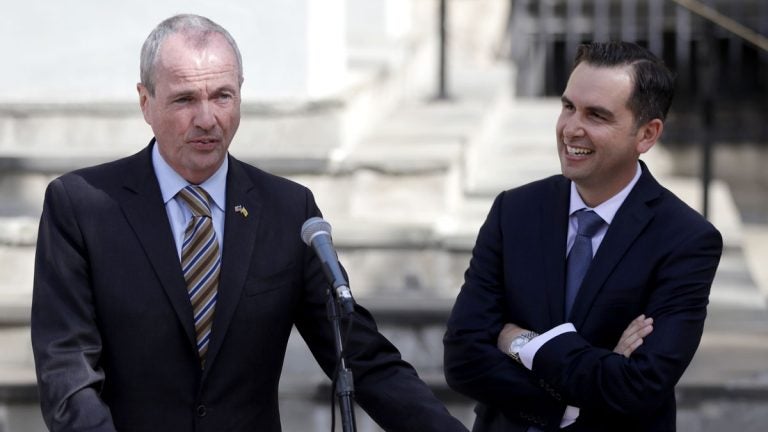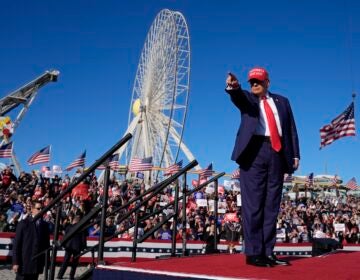South Jersey just got outmaneuvered in the 2017 governor’s race

Phil Murphy (left) speaks after receiving the endorsement from Jersey City Mayor Steve Fulop. (AP Photo/Julio Cortez)
Phil Murphy locked up the Democratic nomination for governor last week with an endorsement blitzkrieg that within 24 hours drove his chief competitor out of the running, averted a divisive and costly primary, and restored party control to the hands of north Jersey leaders.
In quickly withdrawing from a race he never formally entered, Senate President Steve Sweeney (D-Gloucester) acknowledged that his candidacy was hopeless in light of the support pledged to Murphy by party chairs in the vote-rich north.
Other Democrats who’ve expressed an interest in seeking the nomination will in all likelihood reach the same conclusion as Sweeney.
Murphy’s readiness to self-finance his campaign, freeing the county leaders to direct their resources to legislative and local races, weighed heavily in the decisions to coalesce behind his candidacy.
Maintaining control of legislative delegations, as well as county and municipal governments, is crucial to the health and wellbeing of political organizations. Patronage positions in the courthouse and city hall belong to the party in power, as does the awarding of contracts for all manner of professional services.
While Murphy’s pitch to guarantee, in effect, that campaign cash would flow exclusively to local contests was a welcome one, the underlying concern for the chairs was the northward creeping influence of South Jersey powerbroker George Norcross, Sweeney’s confidante and patron.
Norcross’ growing reach was viewed with alarm in many Democratic quarters and tension between them was never far from bubbling over.
The most effective method to blunt what they viewed as a threat was to unite behind a gubernatorial candidate and display a level of power that couldn’t be ignored.
When Sweeney withdrew, it was game, set and match for the north Jersey establishment, a full nine months before the primary election.
As his campaign unfolds, Murphy will confront the insistence of the media and his critics to link him to the last Democratic governor.
There are striking similarities between Murphy and former Gov. Jon Corzine — both were high-level executives at Goldman Sachs, both amassed considerable personal wealth, and both are willing to use those resources in pursuit of their political ends. While Murphy shares a professional history with Corzine, it does not extend to the nature of his public life.
Unfortunately and unfairly, Corzine has become synonymous with a failed administration led by a political naif unschooled in the ways of New Jersey’s favorite blood sport.
For preferring to govern on his business experience and background while remaining aloof from the head butting and eye gouging (figuratively, of course) often necessary for political advancement, Corzine paid a price, becoming only the second incumbent governor to fail in a general election bid for a second term.
To the party apparatchiks, the rap on Corzine was that he disliked deal-making and forging alliances — often uneasy and temporary ones of convenience — that come with the job of being not only the leader of the state but also the leader of the party as well.
Other than sharing Goldman Sachs alumni status with Corzine — he retired in 2006 after 23 years with the firm — Murphy’s resume indicates he’s better versed in the political arts.
He served as ambassador to Germany from 2009 to 2013 and, more telling politically, he served as finance chairman of the Democratic National Committee from 2006 to 2009.
Serving as the United States representative to a European nation with whom we are not at war may not be a high qualification for governing New Jersey, but raising millions of dollars for the national Democratic party suggests Murphy understands the mindset as well as the needs and wants of party leaders.
Murphy has fashioned himself as a progressive; that is to say a traditional Democratic left-of-center philosophy in which government plays a more active role across the broad spectrum of issues.
He’s called, for instance, for creation of a state-administered bank to finance infrastructure improvement projects at a lower cost and wants the state to cease risking public pension money in hedge funds.
He supports reinstating the income-tax surcharge on the wealthiest, an increase in the minimum wage, and stable funding for the public pension and benefits system.
The accepted conventional wisdom at the moment is that the governor’s office is the Democrats’ to lose.
Gov. Chris Christie’s public standing is at a historically low level, his administration battered by the ongoing Bridgegate trial and its revelations of political misbehavior, compounded by a sense that the state has lost its moorings. In this environment, Murphy will be aided by a widespread belief that a change in leadership is due.
But, like Marley’s ghost, Corzine will trail Murphy, his one term as governor still fairly fresh in the minds of many Democrats who — via their earlier experience — may be leery of putting their faith in another Wall Street wizard.
A bit of historical perspective is in order here. There has emerged since the 2009 election a narrative that Corzine was a landslide victim. Not so.
Despite the perceived dissatisfaction with his tenure, Corzine lost to Christie by fewer than 87,000 votes of nearly 2.5 million cast — a 48 percent to 45 percent outcome. (Independent candidate Chris Daggett received five percent).
Democrats continue to suffer from a morning-after Corzine hangover. Whether it’s sufficiently debilitating to look to an alternative to Murphy to provide the aspirin isn’t clear at this stage.
It’s certain, however, that Murphy will continue to be associated in voters’ minds with Corzine, just like the recollection of a bad hangover. It will be one of his tasks to banish the headache.
Related stories:
New Jersey state Senator Ray Lesniak said he WILL run for governor.
Sen. Ray Lesniak changes his mind and says won’t run for governor
Democrat Steven Fulop won’t run for New Jersey governor in 2017
New Jersey Republican lawmaker announces bid for governor
______________________________________________________________
NJ Spotlight, an independent online news service on issues critical to New Jersey, makes its in-depth reporting available to NewsWorks.
WHYY is your source for fact-based, in-depth journalism and information. As a nonprofit organization, we rely on financial support from readers like you. Please give today.




